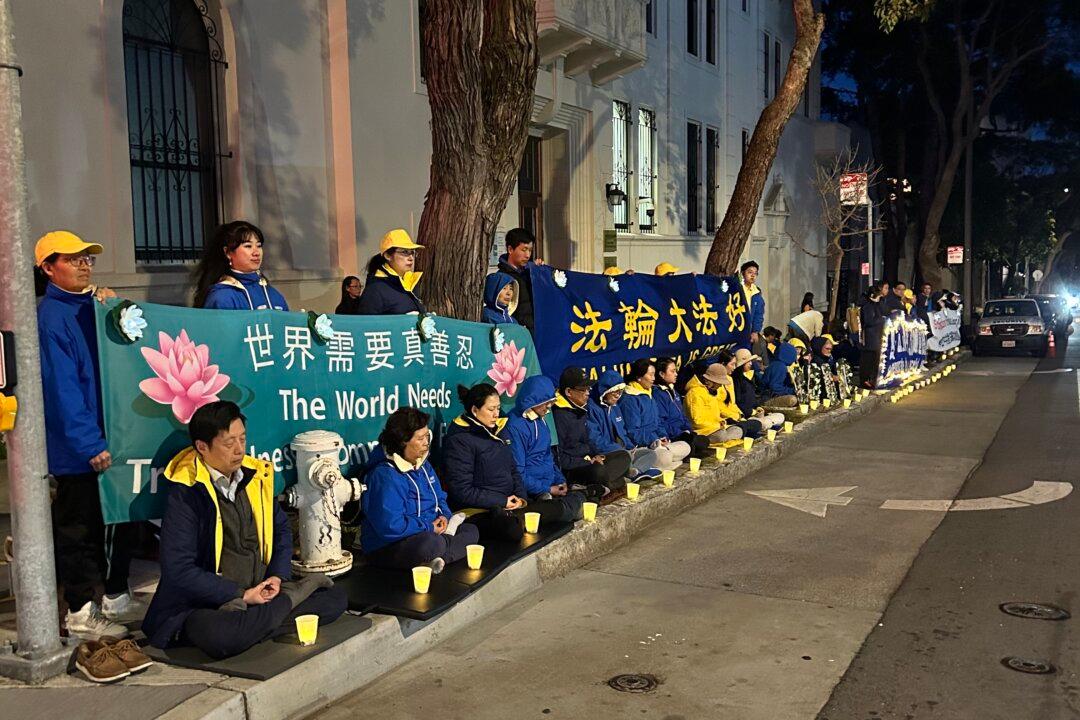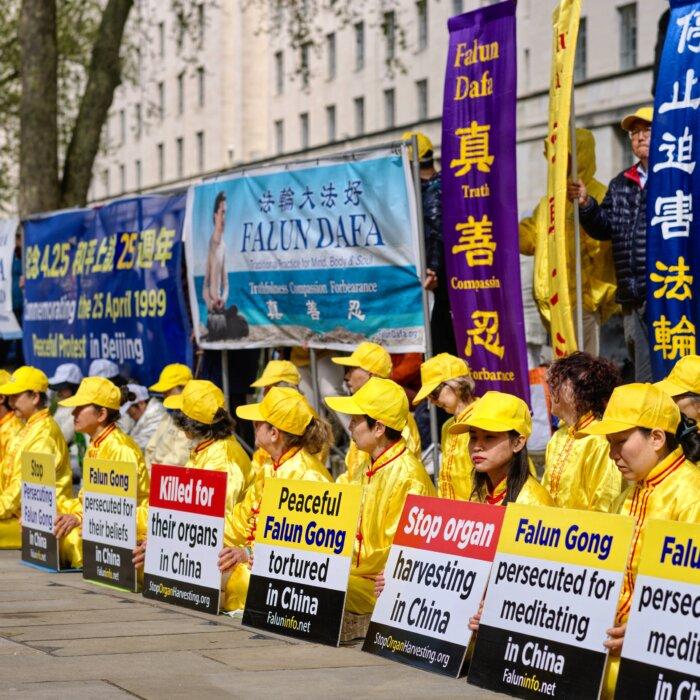SAN FRANCISCO—On April 20, Falun Gong practitioners gathered outside the San Francisco Chinese Consulate for a candlelight vigil in remembrance of those who have been killed in the quarter-century-long persecution carried out by the Chinese Communist Party (CCP).
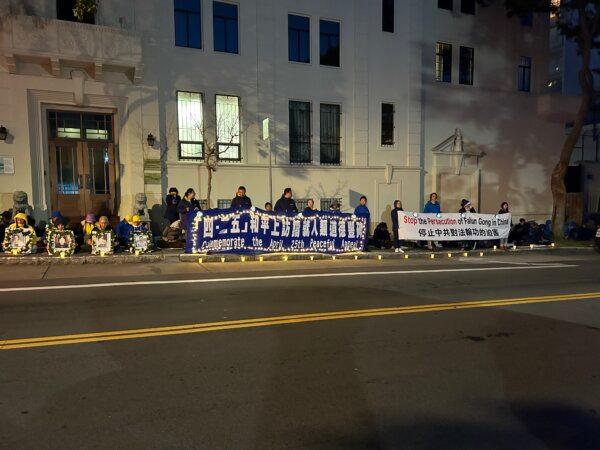
Falun Gong practitioners in front of the Chinese Consulate at 1450 Laguna St. in San Francisco on April 20, 2024. Steve Ispas/The Epoch Times
Falun Gong, also known as Falun Dafa, is a spiritual practice featuring meditation that was first introduced to the public in China in 1992 by Mr. Li Hongzhi. It teaches people to live by the three principles of truthfulness, compassion, and forbearance.
In China, the CCP has persecuted Falun Gong practitioners since 1999. Kerry Huang, an organizer for the vigil, told The Epoch Times that the CCP started the persecution in an attempt to eradicate Falun Gong from society.
The event also commemorated the peaceful appeal that occurred in Beijing on April 25, 1999, just before the nationwide persecution was launched.

Kerry Huang, one of the event organizers, in front of the Chinese Consulate at 1450 Laguna St. in San Francisco on April 20, 2024. Steve Ispas/The Epoch Times
Jenny Zhang, a Falun Gong practitioner attending this year’s event, told The Epoch Times that on April 25, 1999, “over 10,000 Falun Gong practitioners went to the central government” to call for their right to peacefully practice their faith.
“They were so peaceful, so rational,” Ms. Zhang said. “They just wanted people to know that Falun Dafa is good.”
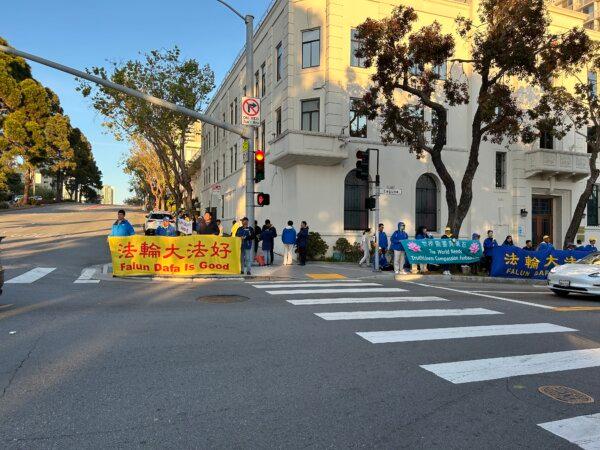
Falun Gong practitioners in front of the Chinese Consulate at 1450 Laguna St. in San Francisco on April 20, 2024. Steve Ispas/The Epoch Times
The 1999 Appeal
Throughout the 1990s in China, Falun Gong became known for its health benefits and gained popularity until it was estimated that over 70 million people were practicing.At first “even the CCP, their national TV station, was praising Falun Gong about improving health,” Matthew Kang, a Falun Gong practitioner from Northern California, told The Epoch Times.
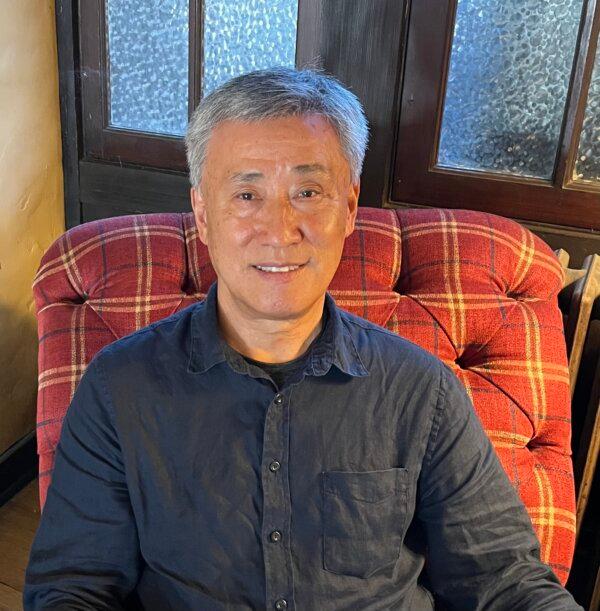
Matthew Kang. Courtesy of Matthew Kang
But with such a large and ever-growing number of practitioners, some CCP leaders started to view this as a threat, especially since these figures exceeded the 60 million members of the CCP at that time.
In mid-April 1999, a magazine in Tianjin city, southeast of Beijing, published an article which slandered Falun Gong. It was written by a professor with connections to top CCP leaders. Local practitioners sought to explain the facts about the lies told in the article, which had already been debunked. However, they were met by CCP police who beat and arrested 45 of them.
More practitioners came and asked the police to release those who were arrested. They were told that to resolve the problem they needed to go to Beijing.
On April 25, 1999, over 10,000 Falun Gong practitioners traveled to the State Council appeals office in Beijing to appeal the unlawful arrest of Falun Gong practitioners in Tianjin.
“When you see the recording, you can see the practitioners were very peaceful,” Ms. Huang said.
She said they left enough space for people to walk past them.
Mr. Kang said, “They even cleaned up the streets before they left the spot.”
Ms. Zhang said that her family tried to travel to Beijing on April 25, 1999 to appeal with other practitioners, but on the way their bus was turned around by CCP officials, and they were told to go home.
“My parents, they actually experienced a lot,” Ms. Zhang said. “They know the Cultural Revolution; they experienced that, and also the Tiananmen Massacre in 1989. So they had a different mindset.”
Her parents told her that if they went, it was possible they could all be killed on the spot.
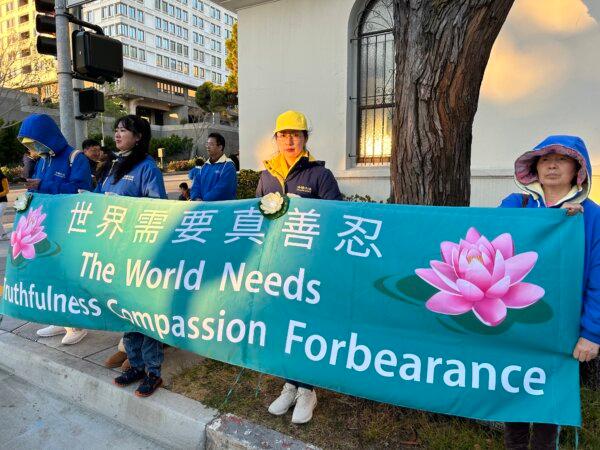
Jenny Zhang in front of the Chinese Consulate at 1450 Laguna St. in San Francisco on April 20, 2024. Steve Ispas/The Epoch Times
Ms. Zhang said, “It doesn’t matter; we should do it.”
The Chinese premier at that time, Zhu Rongji, came out with several staff members to meet the practitioners. Mr. Zhu called four practitioners to come inside and meet the deputy secretary of the appeals office.
The practitioners explained the situation to Mr. Zhu and let him know their three simple requests: Release the Falun Gong practitioners who were arrested in Tianjin, let people practice Falun Gong freely without being harassed by the police, and allow Falun Gong books to be published.
The issues seemed to have been resolved, and the practitioners went home that night. It was the first time since the Tiananmen Square Massacre in June 1989 that so many Chinese had gathered in public to appeal to the government.
CCP officials later claimed it was an organized “siege” that posed a threat to CCP leaders.
Mr. Kang said the incident was staged; that is, the CCP had used the 1999 appeal as an excuse to spread propaganda against Falun Gong and try to turn them into public enemy number one.
“The CCP, they have a tactic,” Mr. Kang said. “If they try to take somebody down, first they use propaganda.”
A few months later, on July 20, 1999, the CCP banned Falun Gong and began its war-like campaign to eliminate the group and its teachings.
Mr. Kang’s Story
It was 22 years ago when Mr. Kang came across the Falun Gong book “Zhuan Falun.”“I found the best thing I could possibly have found in my lifetime,” he said.
At the time, in 2002, Mr. Kang had never heard of Falun Gong.
He said his good friend called him out of the blue one evening, introducing him to the spiritual practice Falun Gong. He asked Mr. Kang if he would like to read his copy of “Zhuan Falun.”
Mr. Kang said he was always interested in spiritual practice. He grew up in Korea and was introduced to the concept of spiritual practice at a young age through radio programs, books, and other literature, but he never read in detail how to improve himself through spiritual practice until he read “Zhuan Falun.”
There was something very special about the book to him. While reading it, he experienced a “refreshing feeling,” he said, so he decided to order his own copy so he could read it over again. He was opened to a whole new world of leading his life through the guiding principles of truthfulness, compassion, and forbearance.
“Literally, it became my foundation,” he said.
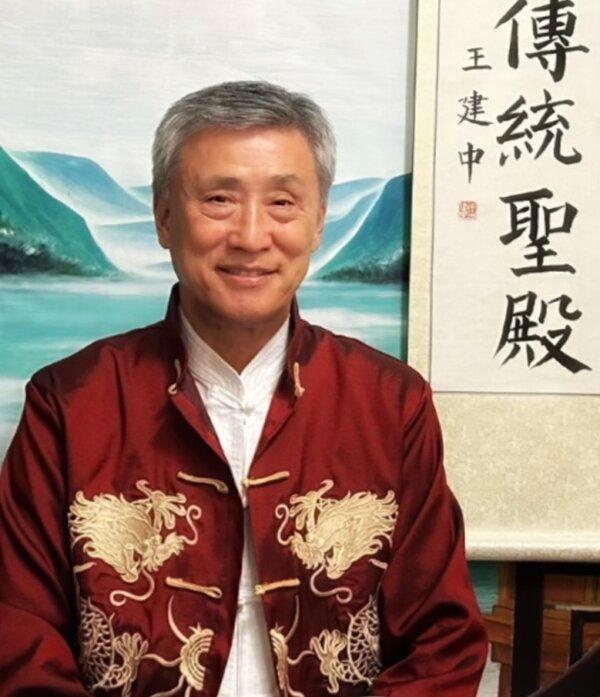
Matthew Kang. Courtesy of Matthew Kang
He uses the principles of truthfulness, compassion, and forbearance to measure himself in all situations. For him, seeking a deeper understanding of these principles is what it means to be a good person.
He said that no matter what he hears from people around him or what he’s going through, all these situations are happening for a reason, to learn something in the process of his spiritual practice.
When he observes people around him behaving in ways that he wouldn’t behave, he still uses it as an opportunity to self-reflect and see if in any way he has actually acted that way too, taking these situations as encouragement to be more diligent in uplifting his character.
Prior to finding Falun Gong, Mr. Kang was working a lot of overtime at the post office. He said he felt tired all the time.
He added that being tired would leave a heavy feeling in his stomach, and if he got irritated or stressed, it would become even worse.
Even when he was growing up in Korea, he had a sensitive stomach, and if he went to a coffee house with friends he would order tea instead, because if he drank coffee his stomach would turn upside down for a few days.
After years of this uncomfortable feeling, Mr. Kang decided to see a doctor about his stomach. The doctor prescribed medicine that only worked for a little while, and then he was back at the doctor, who prescribed something else.
With a family to take care of and having to take time off work to visit the doctor, Mr. Kang grew frustrated returning with the same issue, so he pressed the doctor to really help find a solution. The doctor ran some tests and performed an ultrasound, and they found that he had a gallstone. He went to see a gastroenterologist and ended up having his gallstone removed, but the unsettled feeling in his stomach still returned.
He went back to see the doctor, who told him,“Why don’t you try some meditation?”
While watching TV, Mr. Kang came across a Korean-style breathing meditation. He would drive two hours one way to the class, dedicating every Saturday to it for a year and a half. He said his wife pressured him, telling him that he was wasting his whole day on this, but he told her that he was doing this to help make his body healthy. He said he had some positive experiences, but in the end he was still looking for something more. That’s when he was introduced to Falun Gong by his friend.
After he started practicing Falun Gong, over time the pain in his stomach naturally went away, he said.
“My health was taken care of, and I didn’t even know it; I didn’t even pay attention,” he said.
After years of avoiding things that would upset his stomach, he was able to enjoy a cup of coffee again.
His family started to take notice of the positive changes happening within him. His wife noticed that he was becoming more mellow and stopped having a short temper.
While he was doing the Falun Gong sitting meditation, his wife noticed that he looked very peaceful, and it left an impression on her. So one day while she was talking to a relative on the phone about someone’s sickness, she recommended that they should also try Falun Gong.
One time, Mr. Kang had just spent a long weekend rehearsing with a marching band formed by Falun Gong practitioners. On his way home, towards the end of a 2-hour drive, Mr. Kang started to feel sleepy.
He turned on some music to keep him awake and thought he was going to be okay. The next thing he knew, he awoke to find himself at a complete stop, on the shoulder of the freeway.
“I probably dozed off; I don’t know how long,” he said. “There were no cars coming or going. It was only me there.”
He realized what had happened, and he took off quickly. He remembers feeling serene and peaceful at the time, like he was being watched over and protected.
World Falun Dafa Day
World Falun Dafa Day is observed on May 13 every year, during which practitioners worldwide gather locally to celebrate the spiritual discipline and its positive impact on millions of people around the globe.The day also celebrates practitioners’ efforts to uphold their freedom of belief in the face of brutal persecution by the Chinese communist regime. May 13 is both the anniversary of Falun Dafa’s public introduction and the birthday of its founder, Mr. Li Hongzhi.
Mr. Kang said, “I’m looking forward to going to San Francisco to meet more people and talk about this great practice with all these people that I come across.”
He said he will go and join a parade put on by Falun Gong practitioners from the San Francisco Bay Area, and he will hand out flyers introducing people to the spiritual practice.
The Falun Dafa Day parade usually starts by the Ferry Building on the Embarcadero, which is a popular spot for tourists. While there on previous occasions, Mr. Kang has met many people from other states and countries, including places in Europe and South America, he said.
On one occasion, he was talking to a pilot from Finland. He said the pilot had looked down from his hotel window and seen Falun Gong practitioners gathered around, so he came down to find out what was going on.
During their conversation, Mr. Kang told the pilot that he was meant to come across Falun Gong on that day.
“I gave him a flyer and told him, ‘Keep it in a good place,’” Mr. Kang said.
He told him that if you practice Falun Gong, it can make you become a better person.
Free From Communist Control
In 1996, when the practice was rapidly gaining popularity in China, Falun Gong withdrew from the state-run Qigong Science Research Association of China because of pressure to establish a Communist Party branch and charge fees for the practice.Mr. Li wanted to keep the practice free of political influence. He also wanted it to remain a personal practice that doesn’t have formal membership and is always shared free of charge.
Consequently, Falun Gong became the largest group in China outside the CCP’s control.
In sharp contrast to the CCP, Falun Gong’s teachings reintroduced the ancient wisdom of spiritual development, belief in the divine, and traditional values, which had been passed down in Chinese civilization for millennia. Many practitioners have mentioned that the core tenets of Falun Gong—truthfulness, compassion, and forbearance—are the exact opposite of communist culture, which rules through deceit and struggle.
Some CCP leaders feared that Falun Gong’s strong moral code could undermine the CCP’s violent, totalitarian tactics for controlling society.
Faluninfo.net contributed to this report.
